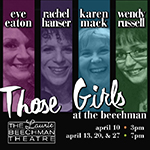Clint Holmes
Between the Moon and New York City: The Songs of Peter Allen
54 Below, NYC, June 1, 2023
Reviewed by Alix Cohen

Ciint Holmes
Photo: Stephen Sorokoff
I don’t remember the last time I exited a cabaret show with such a wide grin. Clint Holmes’ celebration of Peter Allen at 54 Below, though not exclusively full of happy material, was infectiously buoyant. Holmes made everything personal. He’s occupied by lyrics and puppeted by music—the man can mooove—and his warm, muscular vocals and appealing personality swept us up in an exhilarating evening that was over too soon.
Allen’s “The Lives of Me” and “Not the Boy Next Door” (the latter written with Dean Pitchford) offered a subdued prologue and a taste of John Isley’s raring-to-go sax. “You used to live in New Yawk Cidi (New York City)/Then you moved to L.A,”Holmes sang as he loped across the stage, bouncing, leaning out, connecting. The man was never still. His bones vibrated with rhythm. “Why do you have to be one/When both are so much fun?” he playfully continues. (These lyrics are from “Bi-Coastal,” written with David Foster and Tom Keane.)
“Don’t Cry Out Loud” (written with Carole Bayer Sager) arrived glazed by a light piano (provided by music director Michael Orland) with a pinch of cymbal (provided by Jakuba Griffin). Both hands grasped (and sometimes finger played) the microphone. Holmes has a particularly fine relationship with his voice. As Kenny Rogers might say, “he knows when to hold ’em and when to fold ’em.
” During an instrumental parenthesis, the performer’s brow remained furrowed, his focus complete; he rivets.
“The More I See You” (Harry Warren/Mark Gordon) is an example of a song Allen (re)popularized but didn’t write. Sung at first with only Griffin’s cool percussion, the unusual waltzy arrangement worked so well one couldn’t help regretting when the band joined in. Holmes peppered the show with slight biographical tidbits about Allen. He swiveled so naturally, seeming to see us, that we didn’t consciously realize we were being included.
“Peter wrote love songs to New York” introduced a filmy “Six-Thirty Sunday Morning” that was accompanied by a light flute, a cascading piano, and a shimmering cymbal that segued directly into the iconic “Arthur’s Theme (The Best That You Can Do)” (written with Burt Bacharach, Sager, and Christopher Cross) “If you get caught between the moon and New York City”you remember; then came“I Honestly Love You”(written with Jeff Barry). The always splendid Nikki Renee Daniels joined Holmes. She employed melisma, adding syllables to and handily bending notes. Both voices were powerful and deftly calibrated; the chemistry was as engaging as the harmony. Daniels offered taut satin emotional vocals. She seemed to round the lyric’s edges.
Here’s an occasion when this well executed show manifested the hand of director Will Nunziata, whom Holmes later thanked profusely. The performers began facing forward, then looked towards one another, locking their gaze. “You don’t have to say it/I see it in your eyes” Holmes sang. They slowly crossed several times as the lyric’s journey changed. “You and Me” (written with Sager) was just gorgeous. Both performers appeared palpably distressed. “I love you,” she entreatingly sang. “I love you,” he responded. Daniels turned, looked back, and walked off the stage.
“I honestly love you,” Holmes sang, as he looked after her, defeated.
An ebullient “I Go to Rio” (written with Adrienne Anderson) was enhanced by the joyful, sinuous dancing of the red-sequin-clad Kelly Clinton-Holmes (the artist’s wife). Charo has nothing on this joyful performer. The rest of us chair dance. “Unlike most singer/songwriters, Peter wrote about everything but his family.” The exception was “Tenterfield Saddler,” which chronicled three generations of Australian saddle makers. A music-box rendition embodied deep feelings of tenderness. “Fly away cockatoo,” Holmes sang; his fingers (and the flute) fluttered and exited on an ethereal whistle.
Holmes’ mother was “a white, British opera singer; his dad a black, American jazz singer.” They met during World War II and were happily married for 60 years.
In tribute, Holmes wrote “1944,” a lovely story-song: “Is there a choice when hearts belong?/Love’s only voice is clear and strong…and they were sure, in 1944.” “My mother taught me how to sing correctly,” we’re told. “My father taught me to enjoy it.” Lucky man!
A reprise of “The Lives of Me” in tandem with “Once Before I Go” (written with Pitchford) was entirely believable. The evening closed with “Everything Old Is New Again” (written with Sager) with much of the audience joining in, and then rising as one. This was a terrific evening.





